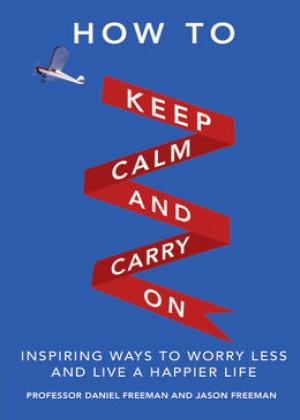 How to Keep Calm and Carry On: Inspiring Ways to Worry Less and Live a Happier Life
How to Keep Calm and Carry On: Inspiring Ways to Worry Less and Live a Happier Life by Professor Daniel Freeman and Jason Freeman is certainly a book for our age. With unemployment on the rise and the the effects of the recession still causing trouble it is no wonder anxiety and stress are on the rise.
The book starts with what anxiety actually is, then it goes into tackling your anxiety and how it can be done. Whilst reading about tackling anxious thoughts and reducing worry I learned a lot, mostly that I worry too much! About everything, even things that will probably never happen. The book also has great tables and exercises to do. A section on coping with nightmares is particularly helpful as I find when I am stressed I usually have bad dreams.
The chapter on relaxing body and mind was informative and interesting. I find that I never switch off and it is just not healthy for me. Some of the tips in this book are incredibly useful and I will be adding them to my life.
The chapter on eating and drinking your way to calmness reminded me to drink less caffeine (no wonder I can’t sleep!) and eat more pasta. All in all, an incredibly knowledgeable and fun book to help you keep calm and carry on. Highly recommended.
~ Worry and anxiety affects millions worldwide. How to Keep Calm and Carry On takes the latest scientific research and tested clinical techniques to show readers how to beat it ~
Britain is on the verge of a stress epidemic. One in five adults worry for at least 60 minutes every day. And more than seven million Brits are believed to have a certifiable anxiety disorder.
Even low-level worry can negatively impact work, home and quality of life. It’s a situation that costs the UK economy over £6.5billion each year.
But as new stress management guide How to Keep Calm and Carry On shows, anxiety need not be an issue in people’s lives any longer.
Calling upon the latest cutting-edge clinical research and proven-to-work techniques, leading British clinical psychologist Professor Daniel Freeman and psychology writer Jason Freeman offer a simple, straightforward roadmap to enjoying a happy and worry-free life.
Throughout the 176-page book, the Freeman brothers — dubbed the UK’s “Worry Tzars” — put the ‘How To’ into the world-famous “Keep Calm” mantra, offering friendly guidance, exercises and
motivating ‘quick wins’ to allow readers to build a realistic and highly-practical programme to keep fears in check and anxieties under control.
Refreshingly and reassuringly, Keep Calm and Carry On is science-based without being technical — something which, ironically, could cause reader anxiety in itself. There’s no jargon or scary psychobabble to be found across its 12 guaranteed stuffiness-free chapters.
Instead, the book — which has just been released by leading educational publisher Pearson —provides an effortlessly accessible manual to feeling more calm, composed and centred.
Speaking about the book, Daniel Freeman — Professor of Clinical Psychology at Oxford University — said: “Our aim is to take the very best psychological research and make it accessible so people can effectively deal with stress and anxiety.”
Whatever life throws at you, the Freeman brothers can show how best to keep calm and carry on.
How to Keep Calm and Carry On: Inspiring Ways to Worry Less and Live a Happier Life by Daniel & Jason Freeman (Pearson) is out now, priced £10.99, from Amazon and all good book shops





